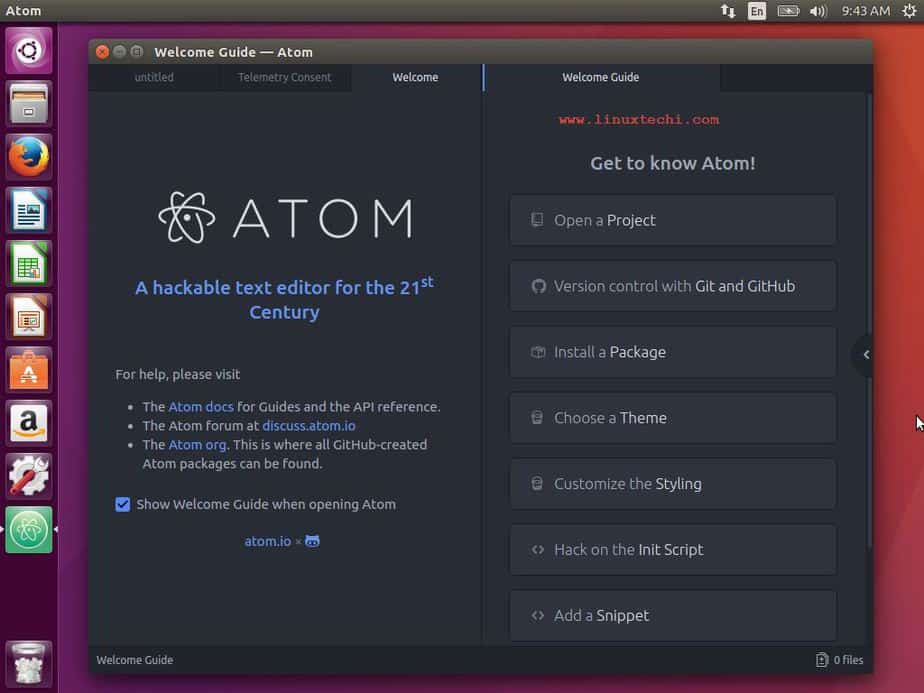Install Atom On Mac

Atom is a text editor hackable to its core. It allows you to modify and add functionality to better fit your needs.
You can use Atom's UI to install the plug-ins listed below using Atom's. Exercise I: Download Atom. This video details how to download and install Atom. In this exercise, we recommend you follow these steps to download Atom. Atom works on Macs running OS X 10.8 or later. Visit the Atom homepage and click Download For Mac. In a few moments, Atom will appear in your Downloads folder as a.zip file.
Yeah, OK, but what does it mean to be a hackable editor? Download revit 2019 for mac.
Install Atom On Mac Os
Everything in Atom is a package and every feature comes in the form of a package. This makes it a highly modular text editor. It is so modular that anyone can write packages for it.
Download music from mac to android. Atom has a bunch of people contributing to it on github, so don’t hesitate to lend a hand!
How to Install a Package?

There are two ways to install packages for Atom,
- Enter apm install package-name on your terminal. Obviously, the Atom package manager, apm, must be installed (you can enter apm to verify installation).
- Open Atom, go to edit > preferences > install and search for the package you wish to install.
Google mac management tools. Both of these methods will download your packages to the default directory (e.g., ~/.atom/packages on linux).
Package States
A package can be active, loaded, unloaded, or inactive. Internally, the PackageManager class (in package-manager.js) manages these states.
Loaded Packages
When a package is loaded it means that Atom knows it is installed and that it will be either activated or deactivated. First, Atom will get every available package by saving the required paths (i.e., folders containing the packages) in an array and use that to create another array containing the packages found on those directories. Loading a package causes Atom to read and parse the package’s metadata and resources such as keymaps, menus, stylesheets, etc.
How To Install Atom
2 4 6 8 10 12 14 | // Ensure atom exports is already in the require cache so the load time // of the first package isn't skewed by being the first to require atom constdisabledPackageNames=newSet(this.config.get('core.disabledPackages')) for(constpack of this.getAvailablePackages()){ this.loadAvailablePackage(pack,disabledPackageNames) }) this.emitter.emit('did-load-initial-packages') |
2 4 6 8 10 12 14 16 18 20 22 24 26 28 30 32 | constpackages=[] if(fs.isDirectorySync(packageDirPath)){ for(let packagePath of fs.readdirSync(packageDirPath)){ constpackageName=path.basename(packagePath) if(!packageName.startsWith('.')&&!packagesByName.has(packageName)&&fs.isDirectorySync(packagePath)){ name:packageName, isBundled:false packagesByName.add(packageName) } } for(constpackageName inthis.packageDependencies){ packages.push({ path:path.join(this.resourcePath,'node_modules',packageName), }) } returnpackages.sort((a,b)=>a.name.localeCompare(b.name)) |
Unloaded Packages
Unloading a package removes it completely from the PackageManager. Here Atom will look for that package in the loadedPackages list and remove it.

2 4 6 8 10 12 14 16 | _.keys(this.loadedPackages).forEach(name=>this.unloadPackage(name)) if(this.isPackageActive(name)){ thrownewError(`Tried tounload active package'${name}'`) constpack=this.getLoadedPackage(name) delete this.loadedPackages[pack.name] }else{ thrownewError(`No loaded packageforname'${name}'`) } |
Active Packages
When a package is activated the activate() method on the PackageManager is called. It gets every loaded package and tries to call activate() on the package’s main module.
This function skips every package that was disabled by the user.
2 4 6 8 10 12 14 16 18 20 22 24 26 28 | async deactivatePackages(){ Promise.all(this.getLoadedPackages().map(pack=>this.deactivatePackage(pack.name,true))) this.unobserveDisabledPackages() } // Deactivate the package with the given name async deactivatePackage(name,suppressSerialization){ if(packnull){ } if(!suppressSerialization&&this.isPackageActive(pack.name)){ } constdeactivationResult=pack.deactivate() if(deactivationResult&&typeof deactivationResult.then'function'){ } delete this.activePackages[pack.name] this.emitter.emit('did-deactivate-package',pack) |
Turns out Atom is constantly keeping an eye on its packages folder, and whenever it sees a change a callback is executed.
The PathWatcher class is defined in path-watcher.js and it is used to manage a subscription to file system events that occur beneath a root directory.
The flow works this way,
- first you install a package by adding it to the packages folder,
- the PathWatcher detects the change and returns the according callback,
- then the PackageManager decides what to do with the new package.
Install Atom On Mac
Wish to Contribute?
Atom Install Shell Commands
As I mentioned before, everyone is welcomed to contribute! You can also create your own packages. I will not go into details about it here since they have done an amazing job at that already. Just head to their site and follow their tutorial on How to Hack Atom.

Install Atom On Mac
UNDER MAINTENANCE